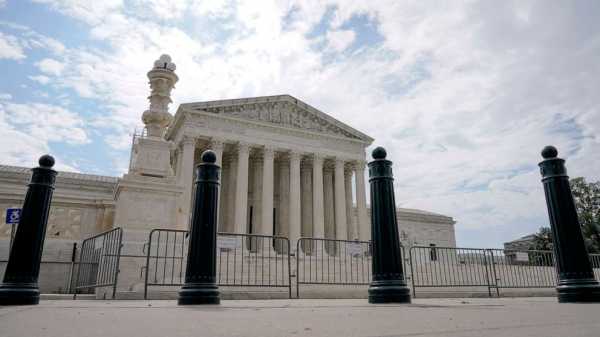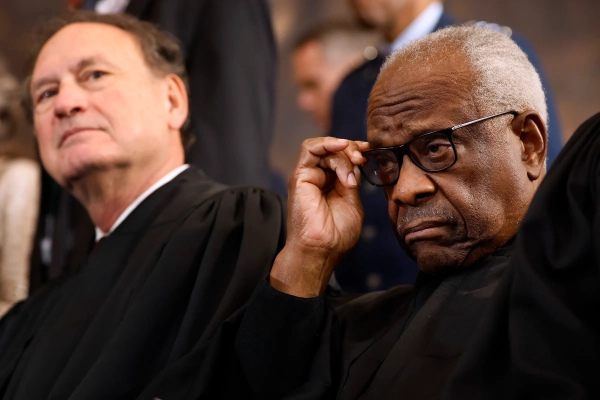Lawmakers, legal experts, presidential candidates — past and present — and others are reacting on Thursday to a landmark ruling from the U.S. Supreme Court setting new limits on the use of affirmative action in college and university admissions.
In a speech from the White House, President Joe Biden tore into the decision, casting it as a step backward.
The court held, in a 6-3 opinion written by Chief Justice John Roberts, that Harvard University and the University of North Carolina's admissions programs violate the equal protection clause of the 14th Amendment.
While the court's conservative wing ruled against affirmative action, the three liberal-leaning justices dissented.
The Supreme Court had repeatedly ruled since 1978 schools may consider the race of applicants in pursuing educational benefits from a diverse student body, so long as they did not use a quota system.
But on Thursday, Roberts, writing for the majority, found that Harvard and UNC's "programs lack sufficiently focused and measurable objectives warranting the use of race, unavoidably employ race in a negative manner, involve racial stereotyping, and lack meaningful end points. We have never permitted admissions programs to work in that way, and we will not do so today."
"At the same time, as all parties agree, nothing in this opinion should be construed as prohibiting universities from considering an applicant's discussion of how race affected his or her life, be it through discrimination, inspiration, or otherwise," Roberts continued.
Below are reactions from notable figures to the ruling.
This story will be updated.
Joe Biden
"The court has effectively ended affirmative action in college admissions, and I strongly, strongly disagree with the court's decision," the president said in his White House speech Thursday afternoon.
He added that "I believe our colleges are stronger when they are racially diverse. Our nation is stronger because we are tapping into the full range of talent in this nation."
He also said he is ordering the U.S. Education Department to examine legacy admissions and "other systems that expand privilege."
After delivering his remarks, Biden was asked by a reporter if the Supreme Court — governed by a 6-3 conservative majority — is a "rogue court," to which he responded that it is not a "normal court."
Universities in the ruling
UNC in a statement said that it was disappointed in the decision but reiterated its commitment to diversity in its student body.
"Carolina remains firmly committed to bringing together talented students with different perspectives and life experiences and continues to make an affordable, high-quality education accessible to the people of North Carolina and beyond. While not the outcome we hoped for, we will carefully review the Supreme Court's decision and take any steps necessary to comply with the law," UNC Chancellor Kevin Guskiewicz said in a statement.
Harvard, too, released a statement insisting it would not take its eye off the goal of maintaining a diverse institution.
"We write today to reaffirm the fundamental principle that deep and transformative teaching, learning, and research depend upon a community comprising people of many backgrounds, perspectives, and lived experiences. That principle is as true and important today as it was yesterday," the school's leadership said in a statement.
Political candidates
Republican presidential hopeful Mike Pence hailed the decision, saying in a statement: "There is no place for discrimination based on race in the United States, and I am pleased that the Supreme Court has put an end to this egregious violation of civil and constitutional rights in admissions processes, which only served to perpetuate racism. I am honored to have played a role in appointing three of the Justices that ensured today's welcomed decision, and as President I will continue to appoint judges who will strictly apply the law rather than twisting it to serve woke and progressive ends."
Vivek Ramaswamy, another GOP 2024 candidate and a biotech entrepreneur, wrote on social media that "affirmative action is a badly failed experiment: time to put a nail in the coffin & restore colorblind meritocracy."

The U.S. Supreme Court, June 27, 2023, in Washington.Mariam Zuhaib/AP
A spokesperson for a political group supporting former President Donald Trump's own reelection bid tied the ruling to Trump's own record in the White House, because three of the justices in the majority were nominated by him to the high court.
"President Donald Trump made today's historic decision to end the racist college admissions process possible because he delivered on his promise to appoint constitutionalist justices," the spokesperson, Karoline Leavitt, said. "America is a better nation as a result of the historic rulings led by Donald Trump's three Supreme Court nominees."
Trump himself later said the ruling marked "a great day for America."
"This is the ruling everyone was waiting and hoping for and the result was amazing. It will also keep us competitive with the rest of the world. Our greatest minds must be cherished and that’s what this wonderful day has brought. We’re going back to all merit-based—and that’s the way it should be!" he said in a statement to ABC News' Rachel Scott.
Florida Gov. Ron DeSantis, Trump's nearest primary competitor, tweeted that the Supreme Court "correctly upheld the Constitution and ended discrimination by colleges and universities."
"College admissions should be based on merit and applicants should not be judged on their race or ethnicity," he wrote.
South Carolina Sen. Tim Scott, the only Black Republican in the Senate, also lauded the ruling, casting it as a sign of the progress that the country is making on race.
"This is a good day for America. Honestly, this is the day where we understand that being judged by the content of our character, not the color of our skin is what our constitution wants. We are continuing to work on forming this more perfect union. Today is better than yesterday, this year better than last year, this decade better than last decade. The progress that we're seeing in this nation is palpable," he said on Fox News.
Members of Congress
Various lawmakers in Washington quickly flooded Twitter with reactions, with Republicans celebrating the ruling as, in their words, a victory for fairness.
"Today's decision by the Supreme Court is a welcome victory for countless students across the country — academia's ivory towers should not divide and promote preferences based on the color of one's skin. In America, fairness is the key to educational opportunity, where one's success is judged by merit rather than arbitrary quotas," North Carolina Rep. Virginia Foxx, the chair of the House Committee on Education and the Workforce, said in a statement.
"Affirmative action forces colleges to put students into a box. It discredits the hard work and diverse backgrounds that countless applicants have, and requires colleges to value one single characteristic above others. This is wrong and un-American," tweeted Tennessee Sen. Marsha Blackburn.
And Senate Minority Leader Mitch McConnell of Kentucky said, in part, "For decades, the Court turned a blind eye as higher education prioritized illegal social engineering over merit. Today’s rulings make clear that colleges may not continue discriminating against bright and ambitious students based on the color of their skin."
Democrats, meanwhile, lamented the decision as a blow to equity.
"The Supreme Court's decision to strike down affirmative action is a devastating blow to our education system across the country. Affirmative action has been a tool to break down systemic barriers and we must continue to advance our ideals of inclusivity & opportunity for all," New Jersey Sen. Cory Booker, one of three Black senators, tweeted.
"The Court's decision to overturn long-standing precedent of Affirmative Action is a fatal blow to equitable & accessible education for all. Failing to consider race as a factor in admissions turns a blind eye to systemic failures of academic institutions to pursue equity," added Georgia Rep. Hank Johnson.
Senate Majority Leader Chuck Schumer of New York called the majority's "misguided" ruling a "giant roadblock in our country’s march toward racial justice. … Nevertheless, we will not be daunted or deterred by this decision and we reaffirm our commitment to fighting for equal educational opportunities for all."
Outside experts, observers and students
Affirmative action has contributed to the rise in students of color attending colleges and universities, experts told ABC News.
Researchers fear the progress made in racial equity in higher education will be reversed, even though they say affirmative action has not been a perfect solution.
"Historically, some of these places like [the University of North Carolina], you literally couldn't go to UNC if you're Black," said Natasha Warikoo, a sociologist at Tufts University and researcher of racial inequity in education.
Attorney General Merrick Garland said in a statement Thursday that "the Department of Justice remains committed to promoting student diversity in higher education using all available legal tools. In the coming weeks, we will work with the Department of Education to provide resources to college and universities on what admissions practices and programs remain lawful following the Court’s decision."
Bunmi Omisore, a student attending Duke University and UNC, told ABC News anchor David Muir during a special report on the network that the decision would not only force students to relive "trauma" in their college applications but would actually define them more by their race.
"The one thing that really is making me sad, I'll just say today, is that my identity has to be my race, the struggles that I've gone through, the trauma I've gone through as an African American woman in the United States. If I were applying for college today, I would have to write about those traumas in my common app essay. I would have to write about those traumas and those very hard experiences for admissions officers to accept the overwhelming truth that we all know, which is that it is hard to be a Black person in America. And I don't think that's fair," Omisore said.
"I think that now that students are forced to talk about racial discrimination and their experiences and their obstacles in their college essays, they're now being known by their race first and by their academics and otherwise, other experiences second because they have to put that in the forefront to prove their experiences through racism in the United States."
Alex Shieh, a prospective Brown University student, disagreed, telling Muir that the decision could help students be judged on their individual merits while recognizing the different ways racial identities are experienced.
"I think that by getting rid of affirmative action, now we look at the individual student and what they've accomplished, and we can look at what barriers they've overcome, but we view them as an individual first and foremost as opposed to just viewing them as a blob in an amorphous, larger racial group," Shieh said.
"For most people, race is just a characteristic, it's sort of the way that your body manifests," Shieh said. "And I think for some students that does play a role in how they experience the world, but for some students it doesn't. And I think that allowing them that option to express that in an essay, for instance, affords much more freedom, because race doesn't affect everybody the same way."
Edward Blum, the conservative activist who has led the legal battle against affirmative action for years and organized the group of Asian American students who brought the cases in Thursday's ruling, similarly celebrated the decision.
"The polarizing, stigmatizing and unfair jurisprudence that allowed colleges and universities to use a student’s race and ethnicity as a factor to admit or reject them has been overruled. These discriminatory admission practices undermined the integrity of our country’s civil rights laws," he said. "Ending racial preferences in college admissions is an outcome that the vast majority of all races and ethnicities will celebrate. A university doesn’t have real diversity when it simply assembles students who look different but come from similar backgrounds and act, talk, and think alike."
Civil rights activists
Civil rights activists expressed disappointment with the ruling but said it would not stop their work to address societal inequities.
"No matter what this court says, we will continue to fight. No matter what this court says, nothing can deprive us of what we call a race conscious future. The future that we deserve, the future that students deserve. Because affirmative action and holistic admissions is not a handout. It's not even really a hand up. It is what students deserve when they bring their whole selves to the table," said Damon Hewitt, president and executive director of the Lawyers' Committee for Civil Rights Under Law.
David Hinojosa, the director of the committee's educational opportunities project, added: "We're gonna challenge them, so they can make it easy and do the changes by themselves or we can do it the hard way. And we are prepared to do whatever it takes, because history is on our side, justice is on our side, the majority is on our side, ensuring equal educational opportunity for all. And, the director of t that goes also, not just to colleges, but K-12 schools, as well."
The Obamas
Former first lady Michelle Obama wrote about her own experience as one of the few Black students on her college campus and said in a statement that "today, my heart breaks for any young person out there who's wondering what their future holds — and what kinds of chances will be open to them."
"Today is a reminder that we've got to do the work not just to enact policies that reflect our values of equity and fairness, but to truly make those values real in all of our schools, workplaces, and neighborhood," she said.
Former President Barack Obama, in a shorter statement, said: "Like any policy, affirmative action wasn't perfect. But it allowed generations of students like Michelle and me to prove we belonged. Now it's up to all of us to give young people the opportunities they deserve — and help students everywhere benefit from new perspectives."
Sourse: abcnews.go.com






